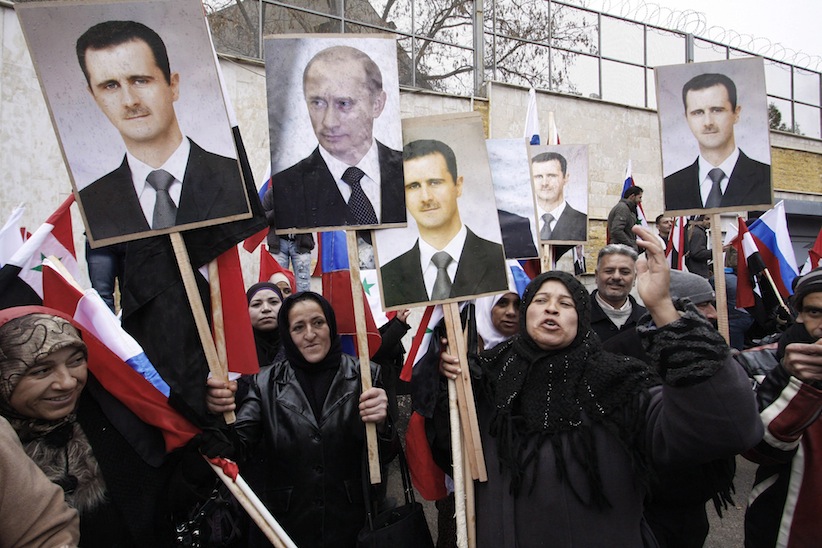There is nothing hopeful about Russia’s military aid in Syria
The welfare of Syrians is the last thing motivating Moscow’s military intervention in Syria on behalf of Bashar al-Assad, says Michael Petrou
Share

Syria’s revolutionaries have been abandoned, shunned, betrayed, insulted and scorned so many times in the past four-and-a-half years that it is unlikely they would even register the presence of another knife in their backs—even one that originates from the Canadian Establishment voice of the Globe and Mail.
And yet the paper’s editorial on Saturday, which claims Russia’s escalating military intervention on behalf of Syrian dictator Bashar al-Assad offers a “glimmer of hope,” neatly encapsulates how little most of the West thinks of their struggle, and how utterly alone they are.
Russia in recent weeks has been streaming hundreds of troops and significant military hardware into Syria. Some 28 Russian warplanes and 15 attack helicopters are reportedly now in Syria, along with tanks and armoured personnel carriers. There are credible reports (based in part on Russian voices in combat footage from Syria) that Russians are already fighting on the ground for Assad.
Russian President Vladimir Putin’s explanation for this is that Russia is helping Assad fight terrorism—specifically, the jihadists of the so-called Islamic State, who have taken over large chunks of the country, which they have cleansed of religious minorities by killing or ethnically cleansing them, and of homosexuals by throwing them off buildings.
But Assad has, in fact, shown remarkably little interest in fighting Islamic State. The bulk of his regime’s military efforts have been directed at other more moderate opposition groups. Assad has always wanted to portray the movement against him as a radically Islamist one. From the beginning of the uprising, when he released from prison jihadists while continuing to jail more secular activists, Assad has worked to shape events on the ground to fit this narrative. Barrel-bombing civilian neighbourhoods in Aleppo while leaving Islamic State mostly unmolested in Raqqa is part of this strategy. His ultimate goal has been to convince the outside world it must choose between him and Islamic State.
It’s worked. In August 2011, U.S. President Barack Obama said, “The time has come for President Assad to step aside.” A child born then, if still alive, is now old enough to run and talk and attend school amid bombed-out urban rubble in Syria, or perhaps among the dust-blown tents of a refugee camp in a neighbouring country. But it seems Obama has concluded he was too hasty in 2011. His secretary of state, John Kerry, now says America won’t be “doctrinaire” about when Assad leaves. He doesn’t have to go “on Day 1 or Month 1 or whatever.”
Syrians, however, who have died by the tens of thousands at the hands of Assad’s forces, proxies and allies, don’t have Kerry’s lackadaisical patience, and have continued to fight for Assad’s defeat. Which brings us to Russia, and why Russia seems intent on preventing that.
According to the Globe: “Even in Mr. Putin’s Russia, there is still some international public-spiritedness, or at least enlightened self-interest. When it clearly emerged in 2013 that the Syrian government of President Bashar al-Assad had chemical weapons in its possession, Russia did take a constructive part in the negotiations to dispose of those weapons.”
First of all, what emerged in 2013 wasn’t that the Syrian government had chemical weapons in its possession—it was that the government was using them to slaughter children. Putting that aside, it’s ridiculous to suggest “international public-spiritedness” had anything to do with Moscow’s role in negotiating the disposal of Syria’s chemical arsenal.
Russia acted to prevent the then-looming air strikes that America, Britain and France had been shamed into preparing to launch against Assad as a result of his chemical-weapons attacks. Russia’s only interest was in protecting Assad.
Its motivations today are the same. Among the gear Russia is sending Assad is, reportedly, an advanced anti-aircraft missile system. Islamic State doesn’t have any planes. Such a system, however, might complicate future plans to impose a no-fly zone over Syria to curb Assad’s bombing runs on civilians.
Propping up Assad serves Russia’s interests by demonstrating that, unlike America, it is not a fickle friend. Other regimes will take note. Russia also has significant military assets in the country, including a naval base. Whatever desire Putin has to combat jihadists in Syria—and these include Russians who may return to and threaten their home country—this is secondary to its larger goals of undermining America’s already declining influence in the Middle East, and securing and expanding its own footprint there.
What most certainly is not motivating Moscow is the welfare of Syrians. Were that the case, Moscow would not be lending its military muscle to the country’s most blood-soaked killer. It is conceivable that Russia would agree to an illusionary “transition” in which Assad steps aside but the infrastructure of his police state remains. The face on billboards would change, but Russia’s interests would remain protected, and the regime’s assault on its people would continue.
But most Syrians will never accept this—which makes the Globe’s call for a coalition government including both Assad’s fascist Ba’ath Party and the opposition Free Syrian Army fantastical.
“I think we will win,” Khalid Tamil Mohammed, a Syrian refugee in Iraq, told Maclean’s last year. “It will come in two ways. If we have the help of the outside world, the revolution will succeed quickly. By ourselves, it will take a long time.”
At least now he has his answer.